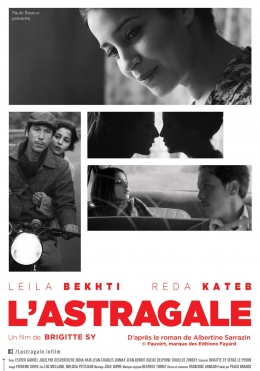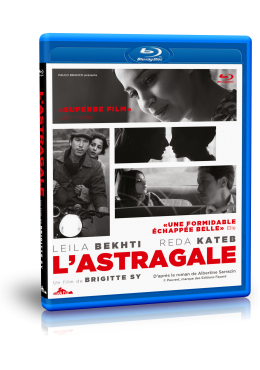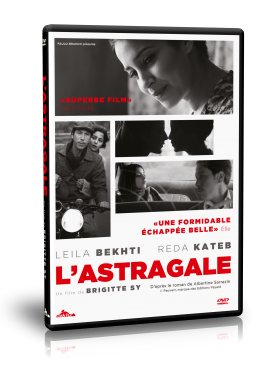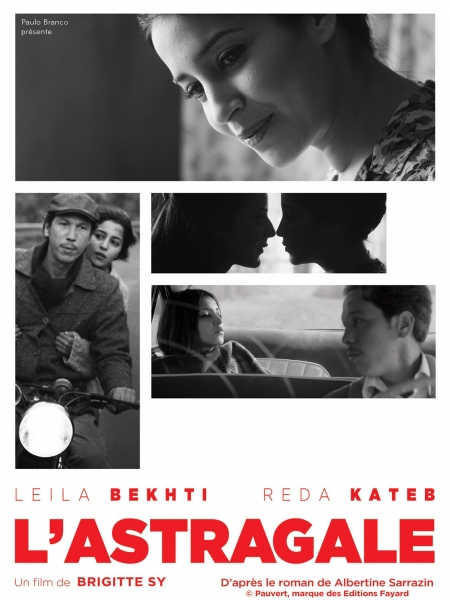On a night of April 1957, Albertine, a brilliant and rebel 19-years-old girl, jumps from the wall of the prison where she’s serving a sentence for a holdup. In her fall, a bone from her ankle breaks : the astragal. She is rescued by Julien, a fugitive and so a burning passion is born between them. He takes her to Paris and hides her. But while he leads his gangster life here and there, the young woman struggles for her freedom and against the wounds inflicted by Julien’s absence. Out of her desperation to be with him, she creates beautiful poetry.
Available in
Blu-ray and DVD
Blu-ray
Bonus
• Panorama Emission: “Les menottes et la plume” (Questions to Julien Sarrazin)
• “Lecture pour tous”, issue of December 7th 1966 (Interview with Albertine Sarrazin)
• “Dim, Dam, Dom”, issue of January 28th, 1966 (Portrait of Albertine Sarrazin)
• “De Soleil and Azur”, broadcast of 19 January 1967 (Albertine Sarrazin in signing session)
• JT Montpellier: Julien Sarrazin continues the investigation to clarify the death of his wife Albertine
Language:
French
Subtitles:
No subtitles
Disc features:
96’ | BD 25 Region B | 1080p | Format 2.35: 1 - Screen 16/9 | B / W | Audio DTS-HD 5.1 | GENERAL AUDIENCE
Discs:
1
DVD
Bonus
• Panorama Emission: “Les menottes et la plume” (Questions to Julien Sarrazin)
• “Lecture pour tous”, issue of December 7th 1966 (Interview with Albertine Sarrazin)
• “Dim, Dam, Dom”, issue of January 28th, 1966 (Portrait of Albertine Sarrazin)
• “De Soleil and Azur”, broadcast of 19 January 1967 (Albertine Sarrazin in signing session)
• JT Montpellier: Julien Sarrazin continues the investigation to clarify the death of his wife Albertine
Language:
French
Subtitles:
English, Portuguese
Disc features:
96’ | DVD 9: DUAL LAYER / PAL | Format 2.35: 1 - Screen 16/9 compatible 4/3 | N / B | Audio 5.1 Dolby Digital | GENERAL AUDIENCE
Discs:
1
Cast
Leïla Bekhti Albertine
Reda Kateb Julien
Esther Garrel Marie
Jocelyne Desverchère Nini
India Hair Suzy
Jean-Charles Dumay Roger
Jean-Benoît Ugeux Marcel
Delphine Chuillot Catherine
Zimsky Riton
Billie Blain Coco
Crew
Director Brigitte Sy
Based on Albertine Sarrazin’s novel, ©Pauvert, marque des Editions Fayard
Script Brigitte Sy, Serge Le Péron
Produced by Paulo Branco
Cinematographer Frédéric Serve
Production Manager Nicolas Picard
Set Design and Wardrobe Françoise Arnaud
Script Supervisor Virginie Prin
Editing Julie Dupré
Sound Luc Meilland, Mélissa Petitjean
Original Music Béatrice Thiriet
An Alfama Films production

Brigitte Sy
Director's Note
« I spent a quarter of my life in prison, I moved to juvenile court, correctional, Assises, I fought, I sighed, I laughed; also I know deep in my certainty that under the tangled bushel of rock and scrap metal, sleepless nights and gray hours, there is always one day, a way back... » A.S
When very young I read Astragal, I must have felt my destiny would be tied, though not exactly like Albertine Sarrazin’s, to prison.
It’s possible that in my distant nights, I dreamed of being Albertine, long before walking myself on the other side of the wall. Or maybe I dreamed that this royal and mischievous woman, gentle and violent, ironic, intellectual, sensual and tender, aggressive and determined, was my mother.
Astragal is the story of a passionate love: from a 20 years old young girl to a man who took her in, wounded, at the foot of the prison wall she just escaped one night of April 1957. Albertine’s escape will end in June 1958 with her arrest in Paris.
The action of my movie is set between these two dates.
Astragal is an extraordinary story, through the miraculous encounter between Albertine and Julien, intensified by their obstacles to be together.
Thanks to him, she walks again. She suffers from her physical injury but it’s mostly from love that she aches.
It’s also the portrait of a young woman whose passion for extreme, love of freedom and exhilaration of youth make her an eternally modern heroine. Albertine doesn’t belong to anything, she belongs to herself. She is her world, her land, her own planet. A planet on fire that will explode later in full flight.
On the run, and in a war against everything that hampers her at the time when Algeria is running with fire and blood, when the first attacks occur in France and when the FLN hunt is launched. Albertine, born in Algeria, abandoned then adopted by a French couple, "ignores" her North African origins. She walks the streets of Paris and runs throughout France. Wanted, every minute of freedom may be the last, every frown threatens her of a treason.
If her extraordinary ability to believe she is indestructible preserves her from the dangers that threaten her, it’s mostly her indomitable need to write that saves her. Writing is Albertine’s skin. To reach her in her body and soul, it would have been necessary to prevent her from writing.
This run, the prostitution, the loneliness, the wait, the risks taken, it’s a way to keep living while waiting to find Julien. All things considered, the end of the film, at the moment of their radical separation, is the true beginning of their great love story, as Albertine wrote, "without land, without home".
Recently I was listening to a philosopher on the radio quoting another. "There is no explanation for love", this is obvious, but when he added; "We do not love someone because of its qualities, but it’s because we love this person that we find qualities", he enlightened my whole day...
Leïla Bekhti and Reda Kateb
It was the morning of the day I heard for the first time the voice of the Jewish-Arab singer Line Monty (we hear her sing in the movie) that I thought about offering the role of Albertine to Leila Bekhti.
It was the evening of the day Leila said yes that I offered the role of Julien to Reda Kateb.
Albertine and Julien Sarrazin said "I do" all over again when the faces of Leila and Reda found themselves together in a picture of my film.
I deeply believe that Leila was supposed to meet Albertine Sarrazin, in her life as an actress but also in her personal life. I know this encounter happened, how it was right and necessary – for the movie and Leila.
I knew the sweetness of Julien Sarrazin, his humanity, his generosity. I understood it by meeting Arlette Pautou, his second wife, accompanied by Reda Kateb. Arlette “told” us Julien. From Reda I knew the actor, I didn’t know the man; sweet, kind and generous.
When we left, Arlette looked at Reda and not on purpose sent him a "goodbye Julien." We smiled and went out confident, somehow.
Yes, Albertine, "there is always one day, a way back... »
The days
From escape to deflection, through a chosen prostitution and her homosexual loves, Albertine’s sharp personality contrasts with the ultra-conservative France of the late 50’s.
Making a "period" film is refusing to prove to each plan detour that the film’s objective signs (costumes, cars, hairstyles, furniture) are compliant and fearing that they will become a show for themselves.
Before the shooting, I discovered Marcel Hanoun’s film A Simple Story, filmed in 1957. I recognized frameworks and lights I had imagined for my film. Then, I thought that the formal requirement of this movie shot in 1957, would be an example for me and a reference in the stylization of the sets that we sought to represent. It was for us, Frédéric Serve the cinematographer and myself, through the sobriety of frames and a rigorous work of light, that we thought possible to make credible this period, and the streets of Paris, where Albertine Sarrazin’s steps are still resounding when I walk at certain hours of the day.
Brigitte Sy,
director


















